- Home
- Chris Wraight
Stormcaller Page 10
Stormcaller Read online
Page 10
‘He calls himself Falvo,’ said Njal. ‘He is of the Death Guard. All of which we could have taken from the armour pieces before they went to the furnace. Aside from that, he doesn’t even scream.’
Delvaux regarded the prisoner with eager appreciation. ‘Then this will be a long and messy business. Klaive? What do you think?’
Klaive glided up to the Plague Marine, running violet eyes over the contours of his broken flesh. ‘I think there are things we could do,’ he said.
‘What do you mean?’ demanded Njal.
Klaive withdrew a long casket from his robes – a slender wooden case the length of his forearm, inlaid with silver. ‘May I?’ he asked.
Álfar looked at Njal, who nodded, and Klaive opened the box. Inside was a dagger with an iron hilt. A script ran down the blade, etched in miniscule and swaying across the metal like a serpent. Klaive discarded the box and held the blade up before the Plague Marine. It glinted dully in the red light.
‘Cutting won’t hasten this,’ said Álfar. ‘We tried it.’
‘I do not intend to cut him,’ said Klaive, running his finger along the edge of the blade. ‘But he knows what this is – look at his eye.’
The Plague Marine stared at the blade as it neared him, going rigid in his bonds. Sweat broke out over his bone-pale hide. ‘Where did you get that?’ he slurred, bloody saliva foaming over his split lower lip.
Klaive drew closer, reaching up to hold the blade just over the Plague Marine’s forehead. ‘It is a rather fine story,’ he whispered. ‘I could tell it to you, if you wished, but I would rather hear yours.’
Then he pressed the flat of the blade against the Plague Marine’s skin. Immediately the prisoner writhed in agony, shrieking with pain. The smell of burning filled the chamber, curling up from the crisping edges of skin. The Plague Marine spasmed against his bonds, jerking and kicking out, opening up fresh wounds where iron coils bit into his wrists and ankles.
Then Klaive withdrew the blade, letting the Plague Marine recover. The confessor had a strange, eager light in his violet eyes, and his breathing was a little faster than it had been.
‘Tell us, Falvo, what was your task on Ras Shakeh?’ Klaive asked.
The Plague Marine regained his breath, still sweating in rivers. He shot a look of pure hatred from his single eye, his nostrils flaring. Pus, mingled with blood, dribbled down from the open weal on his forehead.
When no words were forthcoming, Klaive smiled and took up the blade again.
‘Very well, if you will not–’
‘I was under the Mycelite,’ blurted the Plague Marine, staring at the blade with undisguised anguish. He panted heavily. A thick look of self-loathing rippled across his ruined features.
Klaive gave the two Wolves an assured look of triumph. ‘Well then. I think we may make progress now.’
Njal looked down at the dagger with distaste. Everything in the cell made him feel sullied, and that wasn’t the worst of it. ‘What is on that blade?’
Klaive held it up to the light, turning it slowly. ‘Words,’ he said. ‘Ancient words. We have discovered, in our researches, that words may be used for all sorts of purposes.’
Silently, Álfar’s hand had strayed to his weapon, something neither Klaive nor Delvaux had noticed.
Njal had. In an instant, sickened by what surrounded him, he was tempted to let the shieldbearer use the chainsword, and damn the consequences.
Then, wearily, he shook his shaggy head.
Time is against us,+ he sent, implanting the words into Álfar’s mind. +A warrior cannot always choose his weapons.+
As Álfar relaxed, Njal turned back to the Plague Marine, who now looked up at him with real terror. ‘I do not wish to see that thing used again,’ said the Rune Priest, his voice a low growl. ‘Neither do you.’
Njal leaned forwards, until his beard was almost brushing against the captive’s face.
‘So we will start where you did,’ he said. ‘Who is the Mycelite?’
The lander from Heimdall came down on the plains south of the city, far from the main deployment zones for Delvaux’s forces. Ingvar, Gunnlaugur and Baldr slipped out of the city to meet it, hardly noticed by the crowds of menials and reclamators still at work.
Baldr walked haltingly, as if remembering how to use his muscles from scratch. The bright sunlight made his eyes water, just as the ice-glare had once done before the Helix. He felt heat rising from the packed earth, making him sweat under his loose robes.
In time, such things would cease to register with him – his physiology would return to its chameleonic adaptability, his strength would return, his animal spirits would roar back into immediacy. For the time being, though, he felt as frail as a mortal.
You killed a lot of people.
He remembered so little of it. Every so often, flashes of memory would return – a leering, joyful face burning amid a corona of green fire, a bone pendant spinning in the dark. His hands were still sore from where his skin had burned. Scars puckered the flesh, marring the smoothness of his old skin.
Ingvar and Gunnlaugur said nothing. The antagonism that had needled away between them on the journey out to Ras Shakeh seemed to have abated, replaced by uncertainty over how to deal with this new problem.
I have become the poison at the heart of the pack. Baldr smiled to himself wryly. They fear me now.
In truth, he feared himself. Though he detected no trace of the madness, there could be no denying what had happened. On the balance of probabilities, death waited for him on Heimdall. Stormcaller was not a sentimental soul, and had cut the thread of more heretics and witches than most inquisitors.
So be it. Better to end now than face corruption.
The grey-sided lander waited for them on the desiccated earth, surrounded by drifting clouds of dust, its ramp down. Two dozen kaerls stood before it, all in blast armour and with their helms on. The squad leader slammed his fist against his chest in salute.
Baldr looked at them. ‘Surprised he didn’t send more,’ he said.
He turned, looking over his shoulder. The desert wind skipped and eddied across the plains. The air was clearer than it had been. A charred smell of burning flesh lingered from the pyres, and there was an undertow of plague-sweetness that hadn’t quite been eradicated. The spires of Hjec Aleja glinted in the sun, though the blackened shell of the old Cathedral spoke of the tremendous destruction that still had to be cleared away.
All in all, the place had a stark beauty to it now. He could understand why pilgrims had come here. The pious always sought deserts, the pagan the ice.
‘Until we fight again, brother,’ said Gunnlaugur.
Baldr nodded, at him and at Ingvar, then turned and walked up the ramp into the lander’s crew bay. Once he’d taken his place, the kaerls piled in after him, averting their eyes as they filled the vacant spaces. The lifter engines started to whine, and the ramp lifted noisily.
It slammed closed, locking him within a shaking metal shell. For a moment, he remembered how it had been the first time, dragged from battle and spirited away to Asaheim. He remembered how he’d felt the steel panels tremble, and how he’d been unable to work out where he was or what had happened or whether he was even alive at all.
Then the main thrusters fired, and the lander swayed up into the air.
Ingvar watched it go. The craft’s atmospheric drives angled round on thick ball-and-socket housings, and it gained loft quickly, cushioned on a white-blue cushion of engine-wash. Once high above the city, the orbital thrusters kicked in, hurling it up into a fast-dwindling ascent. After only a few moments it was lost amid the relentless blue of Ras Shakeh’s open sky.
‘So what do you think?’ asked Ingvar.
‘Didn’t sense a thing,’ said Gunnlaugur. He ran his hands over his bald pate, wiping sweat from the tattooed skin. ‘You can smell it, norm
ally.’
Ingvar knew what he meant. The plague-mutants all had it – that faint stench of rotting fruit, lodged deep in their being, hovering over the human stink of illness. You couldn’t disguise it, couldn’t scrub it clean.
‘He is free of it,’ Ingvar said.
‘You trust him, then?’
‘It is not up to me.’
They turned away from the landing site and started to walk back towards the city perimeter. Over to their left, a few kilometres distant in a haze of heat and kicked-up dust, an army of labourers was working to clear and secure the battlefield. The acrid smell of promethium laced the air, the after-effect of fuel-spills and burn-teams at work.
‘We could not have kept it secret,’ said Gunnlaugur, striding out with his swaying, belligerent gait.
‘I know.’
‘But you think we should have tried.’
Ingvar felt a spike of annoyance, and pushed it down. Gunnlaugur had done the right thing, was doing the right thing. ‘I’ll say it again – what if the judgement goes against him?’ he asked.
‘It won’t. You said it yourself – he is restored.’
‘Njal may think different.’
Gunnlaugur stopped walking. ‘He’s gothi, brother. He carries the Law engraved on his staff. If we tried to keep Baldr from him–’
‘I know,’ insisted Ingvar. ‘Still, if he is to be damned…’
He stopped before saying the words. There was no point, not until they knew the outcome.
Gunnlaugur sighed, screwing his eyes up against the glare. By now the lander had passed out of view, leaving the sky empty and trackless.
‘You wanted to speak to me,’ he said. ‘About Hjortur.’
‘You need to know.’
Gunnlaugur nodded. ‘I have kept you waiting long enough.’ He started to walk again. ‘But not here. Come with me to the city. When we are back under shadow, you can tell me everything.’
De Chatelaine had to admit that the reconstruction, its speed and its completeness, had been remarkable. The Cardinal’s troops had swamped the ruins with earth-moving crawlers and atmospheric lifters. Walls had been shored up, hab-blocks purged and made fit for reoccupation, defence towers restored and crowned with fresh ranks of operational weaponry. Temples had been cleansed of filth, their icons scrubbed clean and their statues replaced. Fresh images of the Blessed Primarchs and the Saints of the Ministorum were carted in, drilled into place and unveiled before the populace.
The people flocked back to the altars, falling prostrate before them. The scars of the conflict were close, and they wept openly during the ceremonies giving thanks to the Emperor. Thousands had died, perhaps three out of every four citizens according to some estimates, and those who remained were still in a kind of mass shock, plucked from the brink of annihilation just as all hope had faded.
For the survivors, it was a simple fact – He had delivered them. The faith that had sustained them through the worst of the long night flourished like a plant bursting into flower after drought.
The Cardinal’s agents were everywhere, scouring the ruins of the Cathedral, pulling material out of every last remaining chapel, working their way through the Halicon undercroft. Their attention to detail was phenomenal – they worked as if in perpetual fear of some flaw in their labours being discovered. If some agents took certain liberties, and extended their control into areas where they had no strict right to, then few of the survivors were going to make any kind of complaint. They were too busy praying, and working, and weeping.
De Chatelaine glanced at her chrono. She had lost track of time. The marble surface of her pedestal desk was piled high with papers and data-slates, all of it bearing the skull-invested ‘I’ of the Ministorum. Delvaux’s servants were assiduous, recording everything they did with almost compulsive completeness.
She rose, adjusting her robes over her armour and reaching for her ceremonial sword.
‘Sister Callia,’ she voxed, setting off for the short walk that would take her to the audience chamber where Delvaux had set himself up since returning from Heimdall. ‘It is time.’
Callia joined her just as she reached her destination.
‘Canoness,’ Callia said, bowing. ‘If I may, what is this about?’
‘The restoration of authority,’ said de Chatelaine, smiling. ‘The Cardinal wishes to update us on progress. We should consider ourselves fortunate. Have you ever seen the city in such blessed fervour?’
Callia looked at her uneasily. ‘No. Never.’
De Chatelaine gestured to the guards standing on either side of the two gilt doors, then strode through as they opened.
Inside, incense billowed across the polished floor, carried by servo-skulls trailing lengths of clanking chains. The sun had been filtered out by heavy fabrics, making the hall within glow with a dull, suffused light. Crimson-armoured Battle Sisters stood motionless amid the twin ranks of pillars running down each aisle. The air felt humid, fuelled by glowing brazier-pans.
The Cardinal was seated at the far end of the hall atop a towering throne, crusted with gold-leaf and flanked by helical columns. Cherubim buzzed lazily over an elaborate dome, dusting it with more incense, squabbling and blundering into the stonework. A low dirge of devotional chanting came from vox-emitters set in the high roof.
The Cardinal waited for the two of them to approach. He looked somehow larger than he had on their first meeting. His heavy robes flowed in thick folds over a substantial belly. He slumped in the golden seat, his eyes heavy-lidded, his fleshy fingers drumming on lion’s-head armrests.
‘My lord Cardinal,’ said de Chatelaine, bowing.
Delvaux gazed down at her disinterestedly. ‘Canoness,’ he replied, his voice flat.
‘You have been busy, I see.’
‘These things?’ Delvaux said, looking around absently at the finery. ‘Brought down from Vindicatus. You had nothing suitable here.’
As he spoke, de Chatelaine noticed a Battle Sister move to his elbow, leaning up from the throne’s stepped edges to whisper something in his ear. With a twinge of distaste, de Chatelaine saw the extent of the Sister’s augmetic alterations – the entire left-hand side of her body was encased in bronze plating. Her half-concealed arm was bulky and stiff, ending in a blunt metal clump under a fabric glove. It looked like a flamer.
‘You do not approve of Sister Nuriyah, canoness?’ Delvaux asked, as the Sister withdrew again.
‘Not at all,’ said de Chatelaine, wondering at the Cardinal’s changed tone with her. ‘I commend her diligence.’
‘She is most diligent. She performs every task I set her, even to the gravest extremity. The galaxy is not a forgiving place. It asks sacrifices of us all.’
A servo-skull swooped in from the aisles then, bearing a gold platter. It hovered over the Cardinal’s lap, and he took a piece of peeled fruit from the platter before it swayed away.
‘My lord, did you–’ started de Chatelaine.
‘I return from interrogating the fallen,’ Delvaux said, still studying the fruit. ‘Judgement comes to all. Or did you not preach that doctrine on this world?’
‘We preach the Imperial Truth,’ de Chatelaine said, stiffly.
‘But there is more to our task than the truth, is there not? There is guidance. There is discipline.’
De Chatelaine bristled. ‘My lord, if there is anything you find remiss, then I trust you will speak of it.’
Delvaux took a bite of the fruit, and red-purple juice ran down his chins. He chewed, dabbing at the runnel with a silk napkin. ‘You were in command throughout the invasion?’
‘I was.’
‘Then you bear responsibility for what happened here.’
‘I do.’
Delvaux nodded, taking another bite. ‘Investigations continue. My people have spoken to many of those who served. We hear thin
gs.’
De Chatelaine’s impatience began to get the better of her. ‘Things,’ she said, coldly. ‘Perhaps you will elaborate?’
Delvaux lifted a finger. From the shadows of the aisles, masked by the rows of pillars, de Chatelaine heard a shuffle. A second later, two Battle Sisters of Nuriyah’s contingent emerged, their faces hidden behind white masks. They dragged a bundle of rags between them. Only as they emerged into the pool of dusty light before the throne did de Chatelaine see that the bundle was a man, pulled by slack arms, his head hanging between his shoulders.
The Sisters threw him to the floor. He lay prostrate, as limp as sackcloth.
‘Tell us your name,’ said the Cardinal, chewing the last of his fruit.
At the sound of Delvaux’s voice, the man’s head snapped up. Two wide eyes glared in terror from sunken cheeks. De Chatelaine saw the unmistakable signs of agony in his bearing.
‘Velash, lord,’ he said, his voice panicky. ‘Velash! You asked me this.’
De Chatelaine looked at Delvaux stonily. ‘By what right was this man put to the trials?’
Delvaux ignored her. ‘Tell us what you told Sister Nuriyah, Velash.’
The man stared around him, though it wasn’t clear if he was able to focus any more. ‘They let them in! They let them in. They came across the desert, and they let them in.’
Delvaux nodded sympathetically. ‘That is what you told us, yes. Who gave the order?’
‘The canoness.’
De Chatelaine felt a chill run through her heart. This was a distortion – a grave one. ‘Some mistakes were made,’ she said. ‘We had regiments returning from the front. Quarantine was not perfect.’
‘What happened next, Velash?’ asked Delvaux.
The man grinned. It was a manic, deranged grin – the grin of a man whose mind has turned. ‘They came for us. The plagued. The flesh-eaters.’
‘This is in my report,’ said de Chatelaine, feeling as if she were hardly there.
‘How many died?’ Delvaux asked Velash.
Velash smiled wider. ‘Thousands,’ he said, gleefully. ‘Thousands.’

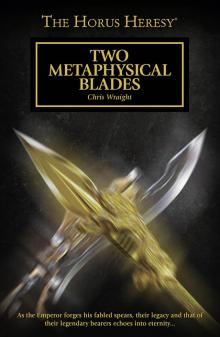 Two Metaphysical Blades
Two Metaphysical Blades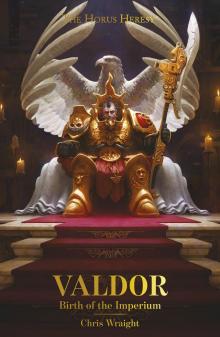 Valdor: Birth of the Imperium
Valdor: Birth of the Imperium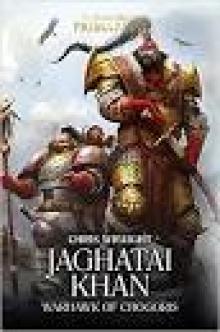 JAGHATAI KHAN WARHAWK OF CHOGORIS
JAGHATAI KHAN WARHAWK OF CHOGORIS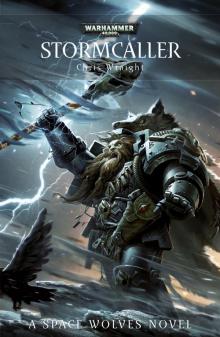 Stormcaller
Stormcaller Child of Chaos
Child of Chaos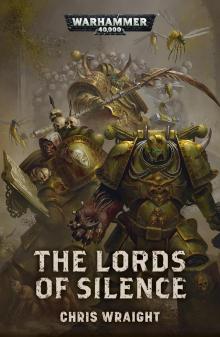 The Lords of Silence
The Lords of Silence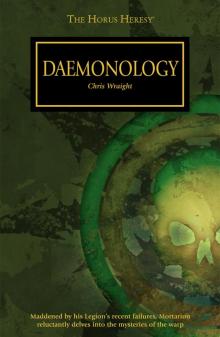 Daemonology
Daemonology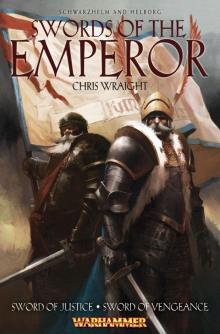 Swords of the Emperor
Swords of the Emperor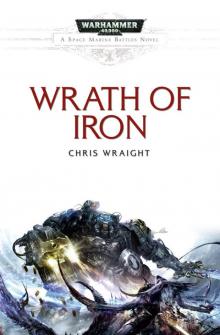 Wrath of Iron
Wrath of Iron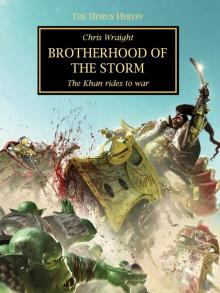 Brothers of the Storm
Brothers of the Storm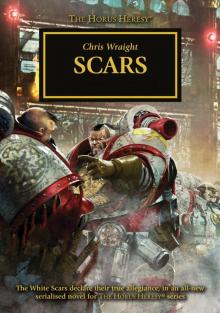 Horus Heresy: Scars
Horus Heresy: Scars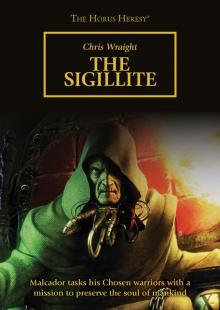 The Sigillite
The Sigillite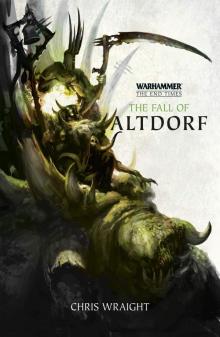 The End Times | The Fall of Altdorf
The End Times | The Fall of Altdorf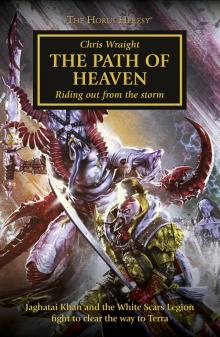 The Path of Heaven
The Path of Heaven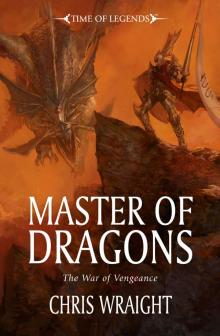 Master of Dragons
Master of Dragons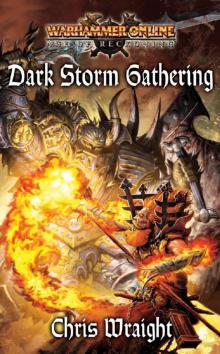 WH-Warhammer Online-Age of Reckoning 02(R)-Dark Storm Gathering
WH-Warhammer Online-Age of Reckoning 02(R)-Dark Storm Gathering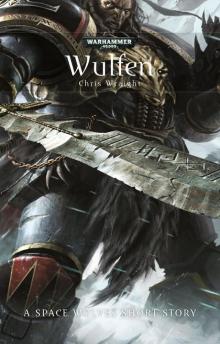 Wulfen
Wulfen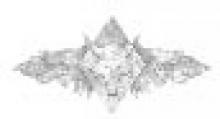 Battle Of The Fang
Battle Of The Fang Onyx
Onyx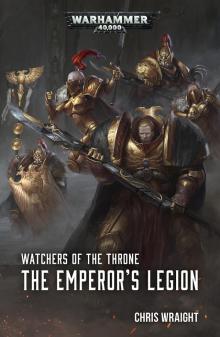 Watchers of the Throne: The Emperor’s Legion
Watchers of the Throne: The Emperor’s Legion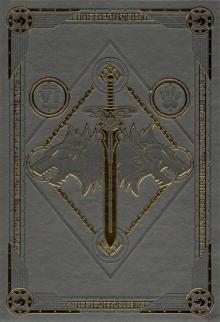 Leman Russ: The Great Wolf
Leman Russ: The Great Wolf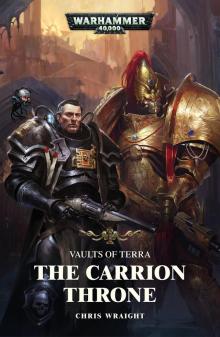 Vaults of Terra: The Carrion Throne
Vaults of Terra: The Carrion Throne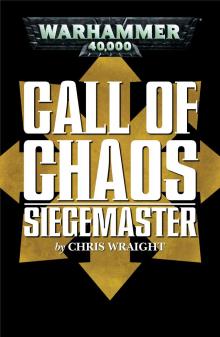 Siegemaster
Siegemaster STARGATE ATLANTIS: Dead End
STARGATE ATLANTIS: Dead End Scars
Scars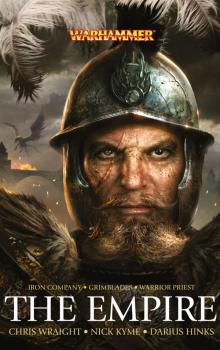 The Empire Omnibus
The Empire Omnibus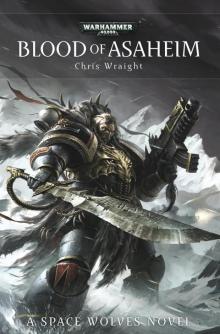 Blood of Asaheim
Blood of Asaheim